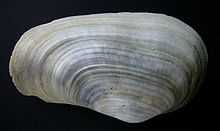Panopea zelandica
| Panopea zelandica | |
|---|---|
 | |
| Scientific classification | |
| Kingdom: | Animalia |
| Phylum: | Mollusca |
| Class: | Bivalvia |
| Order: | Myoida |
| Family: | Hiatellidae |
| Genus: | Panopea |
| Species: | P. zelandica |
| Binomial name | |
| Panopea zelandica Quoy and Gaimard, 1835 | |
| Synonyms | |
|
Panopaea zelandica Quoy and Gaimard, 1835 | |
Panopea zelandica, commonly known as the Deepwater Clam or New Zealand geoduc (geoduck), is a large species of marine bivalve mollusc in the family Hiatellidae.[1] Panopea zelandica is also sometimes called a King Clam or a Gaper in reference to the shell not being closed at either end.
It can be found around the North, South and Stewart islands and occurs mainly in shallow waters (5–25 metres) in sand and mud off sandy ocean beaches.[2] Another geoduc species (Panopea smithae) is found in deeper New Zealand waters.
Like other geoducs P. zelandica burrows downwards in the mud and extends a siphon 30-45 centimetres up to the surface of the substrate. The siphon contains two tubes. Water is sucked down one tube, filtered for food and then expelled through the other.
.JPG)
.JPG)
References
- ↑ Powell, Arthur (1979). New Zealand Mollusca. William Collins Publishers Ltd. ISBN 0-00-216906-1.
- ↑ Deepwater (King) Clam fishery summary - New Zealand Ministry of Fisheries.